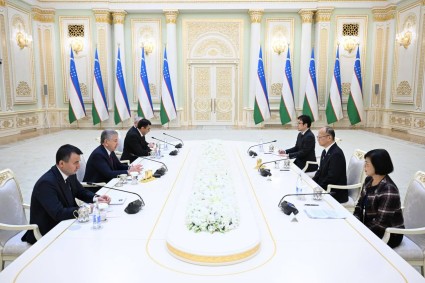Amid overlapping global crises, IFC continues to focus its efforts on leveraging the private sector for inclusive and sustainable development in Central Asia. In fiscal year 2022, which ended on June 30, IFC provided $468 million in Central Asia aimed at expanding access to finance, improving infrastructure and connectivity, and addressing climate change, in line with IFC’s strategic priorities in the region. That work came alongside milestone advisory engagements to bolster key sectors, like agriculture and energy, structure public-private partnerships, and promote gender diversity.
IFC's financing across Central Asia included a $301 million to expand and modernize Kazakhstan’s Almaty International Airport, a project expected to spur commerce and create thousands of jobs. To help expand the region’s connectivity, IFC is also working with the government of the Kyrgyz Republic to attract private sector investments in Manas International Airport, an initiative designed to provide better services to airlines and passengers.
In Uzbekistan, IFC extended a $75 million loan to Uzsanoatqurilishbank that will support the bank's path to privatization, helping it finance more climate-friendly projects and expand lending to small and medium enterprises (SMEs). IFC also provided a $10 million loan to Ipak Yuli Bank to enable it to provide financing to more SMEs, including women-run companies. In Tajikistan, in addition to its work to help develop digital financial services, IFC invested in Eskhata Bank and Imon International to address the financing gaps faced by smaller businesses.
To support Uzbekistan’s transition away from fossil fuels, IFC advised the country’s government on a public-private partnership (PPP) to develop 1 gigawatt of solar energy, a project expected to generate up to $1 billion in private investment. IFC is also advising Uzbekistan as it structures a PPP to construct and operate wind power plants capable of producing up to 500 megawatts of energy. Finally, IFC advised on the tendering of the 1,600-megawatt Syrdarya power project, which is expected to be one of the most efficient thermal power plants in the country.
In the Kyrgyz Republic, in close cooperation with local microfinance institutions, IFC helped 37,000 people construct new homes or renovate existing dwellings, and enabled over 13,000 people to increase their homes’ energy efficiency, saving more than $6.7 million on heating.
To boost competitiveness and productivity, IFC, in partnership with donor countries, helped the government of Tajikistan remove regulatory barriers and attract investment in the country’s key tourism and textile sectors. IFC is also helping spur foreign investment in Uzbekistan’s fertilizers sector, to help modernize the industry and encourage its growth.
Wiebke Schloemer, IFC Director for Türkiye and Central Asia, said: “Facing a host of economic challenges, Central Asian countries need to further diversify their economies if they are to sustain long-term growth and address development challenges like poverty and unemployment. By unlocking the potential of the private sector, the region can propel its economy forward and IFC is committed to continuing to support that process.”
IFC has been investing in Central Asia since 1993—creating opportunities where they are needed most. As of June 2022, IFC's total committed portfolio in Central Asia stood at about $563 million as of June 30, 2022.












